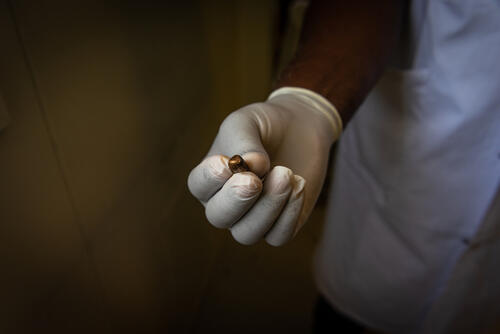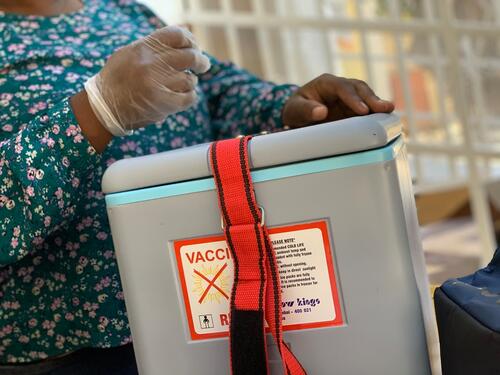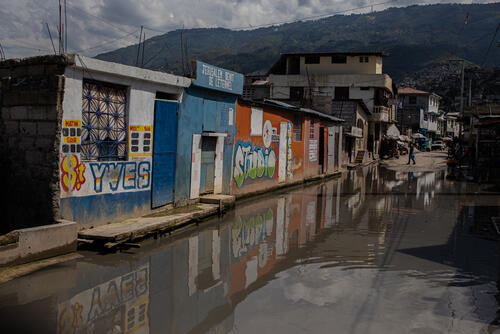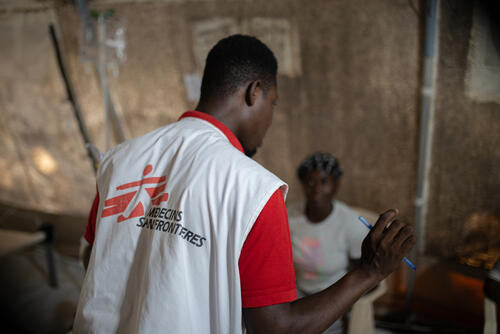- MSF is calling on armed groups to spare civilians and allow aid into Cité Soleil, Port-au-Prince, amidst deadly clashes and fighting.
- Humanitarian organisations must respond to the urgent needs of people who are without water, electricity, healthcare and latrines.
Port-au-Prince - Thousands of people are trapped without drinking water, food or medical care in an isolated area of the Cité Soleil neighbourhood of Port-au-Prince, as armed groups battle for control of the area, warns Médecins Sans Frontières (MSF). MSF is calling on armed groups to spare civilians, and calls on humanitarian organisations to respond to the urgent needs of the people.
Brooklyn, an isolated neighbourhood of Cité Soleil with a population believed to number in the thousands, sits in a marshy coastal area just north of a petroleum terminal. Since 8 July, when fighting broke out in Cité Soleil, residents have been unable to leave Brooklyn amid the clashes, and trucks of drinking water, which residents depend on, have been unable to enter.
“We are calling on all belligerents to allow aid to enter Brooklyn and to spare civilians,” says Mumuza Muhindo, MSF head of mission in Haiti. “We also call on the humanitarian community to respond to the urgent needs of the people in Brooklyn and other neighbourhoods affected by the fighting, including for water, food and medical care.”
Three MSF health workers who live in Brooklyn have been treating the wounded in a private clinic that is the only health facility still functioning in the enclave. On 10 July, MSF was able to evacuate 12 patients with emergency needs from the clinic, including people with gunshot wounds, pregnant women and a child with an urgent health condition.
We have encountered corpses that are decomposing or being burned. It is not possible to estimate how many people have been killed.Mumuza Muhindo, MSF head of mission
“Along the only road into Brooklyn, we have encountered corpses that are decomposing or being burned,” says Muhindo. “They could be people killed during the clashes or people trying to leave who were shot - it is a real battlefield. It is not possible to estimate how many people have been killed.”
The situation within Brooklyn is deteriorating as the clashes continue.
“Unfortunately, thanks to a river, it is a neighbourhood where much of the city's garbage is dumped in the area,” says Muhindo. “People have no access to water, no access to electricity, and there is a great need for healthcare and latrines. Because of the current fighting, the situation has worsened.”
MSF is continuing attempts to evacuate people with critical medical needs from Brooklyn, while many other residents also request help to leave the area, but are unable to do so.
Our teams continue to treat victims of the violence in other areas of Cité Soleil. Staff in MSF's emergency centre in the Drouillard area have been stabilising wounded patients and referring them to hospitals when possible. On 11 July, our staff opened an operating room at the centre, to begin providing emergency surgical care on site. This work has been challenging, in part, due to armed clashes in the immediate vicinity of the centre, forcing staff to take shelter in a safe room for hours.
MSF's Tabarre hospital, where many of the wounded are referred, is increasing its capacity to treat victims of trauma. Since 8 July, the surgical teams at Tabarre have performed about 15 surgical procedures per day for trauma patients.
“Our main focus here is to save as many lives as possible,” says Jean-Gilbert Ndong, MSF medical coordinator.







